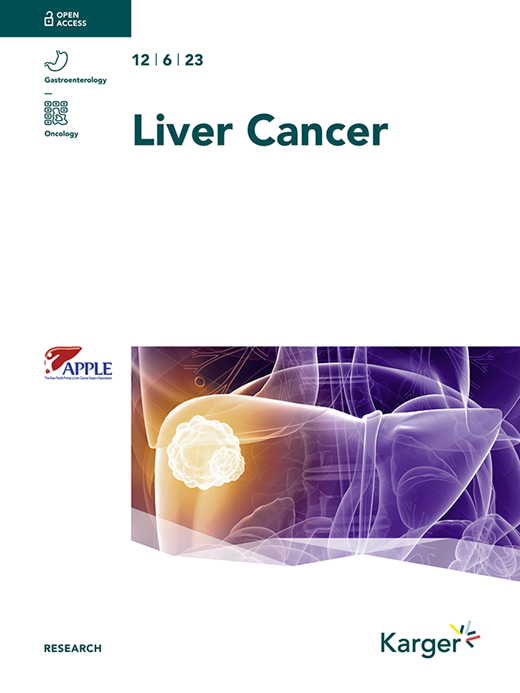Impact of liver fibrosis severity on oncological prognosis in hepatocellular carcinoma
IF 9.1
1区 医学
Q1 GASTROENTEROLOGY & HEPATOLOGY
引用次数: 0
Abstract
Introduction: Cirrhosis is deemed to be a contributing factor to the postoperative recurrence of hepatocellular carcinoma (HCC), however, the precise impact of liver fibrosis on both cancer-specific prognosis remains unclear. This investigation sought to elucidate the effect of liver fibrosis severity on the cancer-specific prognosis. Methods: A total of 524 consecutive patients were included. Recurrence-free survival (RFS) and disease-specific survival (DSS) were compared according to fibrosis stage. Moreover, postoperative outcomes were subjected to analysis in cohorts of patients with F0 and F1-3, as well as in those with F1-3 and F4, who were carefully matched for background factors. Results: The five-year RFS exhibited a significantly worse outcome in the F4 group compared to other stages of fibrosis [5-year RFS: F0 (46.6%), F1-3 (33.1%) and F4 (23.5%), P=0.03 (F0 vs. F1-3) and P<0.01 (F1-3 vs. F4)]. Additionally, the five-year DSS also presented a significantly worse prognosis in the F4 group (5-year DSS: F0 (82.9%), F1-3 (73.6%) and F4 (57.4%), P=0.04 (F0 vs. F1-3) and P<0.01 (F1-3 vs. F4)]. In multivariate analysis, fibrosis 1, 2, 3, and 4 stage (compared with F0) (HR: 1.70, 1.81, 1.89, and 3.99, 95 % CI: 1.10–1.99, 1.39–2.22, 1.41–2.55, and 2.25–5.01, P=0.022, P=0.008, P<0.001, and P<0.001, respectively) was independent risk factor for RFS. After matched analysis, both RFS and DSS exhibited significantly worse prognoses in the presence of more advanced fibrosis. There was a significantly higher incidence of multiple recurrences in the F4 group than the F1–3 group, and a number of recurrences were observed both in the same hepatic segment as the resected side and in the contralateral lobe in F4 group. Discussion/Conclusion: The hazard and recurrence pattern of HCC signifies that the prognosis could potentially be poor, as the hepatic fibrosis likely owing to a higher hepatocarcinogenic potential, even in the absence of progression to cirrhotic condition. The risk of de novo recurrence may also increase with the progression of this fibrosis.肝纤维化严重程度对肝癌预后的影响
肝硬化被认为是肝细胞癌(HCC)术后复发的一个促进因素,然而,肝纤维化对两种癌症特异性预后的确切影响尚不清楚。本研究旨在阐明肝纤维化严重程度对癌症特异性预后的影响。方法:共纳入524例连续患者。根据纤维化分期比较无复发生存期(RFS)和疾病特异性生存期(DSS)。此外,对F0和F1-3组患者以及F1-3和F4组患者的术后结果进行分析,并仔细匹配背景因素。结果:F4组5年RFS预后明显差于其他纤维化分期[5年RFS: F0 (46.6%), F1-3 (33.1%), F4 (23.5%), P=0.03 (F0 vs. F1-3), P<0.01 (F1-3 vs. F4)]。此外,F4组5年DSS预后也明显较差(5年DSS: F0(82.9%)、F1-3(73.6%)、F4 (57.4%), P=0.04 (F0 vs. F1-3)、P<0.01 (F1-3 vs. F4))。在多因素分析中,纤维化1、2、3和4期(与F0期相比)(HR: 1.70、1.81、1.89和3.99,95% CI: 1.10-1.99、1.39-2.22、1.41-2.55和2.25-5.01,P=0.022, P=0.008, P<0.001和P<0.001)是RFS的独立危险因素。在匹配分析后,RFS和DSS在存在更晚期纤维化时表现出明显更差的预后。F4组多发复发发生率明显高于F1-3组,且F4组与切除侧同一肝段及对侧肝叶均有多发复发。讨论/结论:HCC的危险和复发模式表明其预后可能很差,因为肝纤维化可能是由于较高的肝癌潜在致癌性,即使在没有肝硬化进展的情况下。新发复发的风险也可能随着纤维化的进展而增加。
本文章由计算机程序翻译,如有差异,请以英文原文为准。
求助全文
约1分钟内获得全文
求助全文
来源期刊

Liver Cancer
Medicine-Oncology
CiteScore
20.80
自引率
7.20%
发文量
53
审稿时长
16 weeks
期刊介绍:
Liver Cancer is a journal that serves the international community of researchers and clinicians by providing a platform for research results related to the causes, mechanisms, and therapy of liver cancer. It focuses on molecular carcinogenesis, prevention, surveillance, diagnosis, and treatment, including molecular targeted therapy. The journal publishes clinical and translational research in the field of liver cancer in both humans and experimental models. It publishes original and review articles and has an Impact Factor of 13.8. The journal is indexed and abstracted in various platforms including PubMed, PubMed Central, Web of Science, Science Citation Index, Science Citation Index Expanded, Google Scholar, DOAJ, Chemical Abstracts Service, Scopus, Embase, Pathway Studio, and WorldCat.
 求助内容:
求助内容: 应助结果提醒方式:
应助结果提醒方式:


